- Clone
- 1G9 (See other available formats)
- Regulatory Status
- RUO
- Other Names
- VSIG9
- Isotype
- Mouse IgG1, κ
- Ave. Rating
- Submit a Review
- Product Citations
- publications
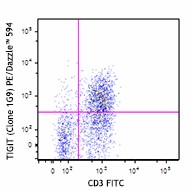
-

C57BL/6 Mouse splenocytes were stimulated with Con A and IL-2 for three days, and then stained with CD3 FITC (Clone 145-2C11) and TIGIT (Clone 1G9) PE/Dazzle™ 594 (Top) or mouse IgG1, κ PE/Dazzle™ 594 isotype control (Bottom). -

| Cat # | Size | Price | Quantity Check Availability | Save | ||
|---|---|---|---|---|---|---|
| 142109 | 25 µg | 118€ | ||||
| 142110 | 100 µg | 306€ | ||||
T cell immunoreceptor with Ig and ITIM domains (TIGIT), also known as V-set and transmembrane domain-containing protein 3 (Vstm3), is a 26 kD, type I transmembrane protein and member of the CD28 family. TIGIT is expressed on activated T cells, follicular T helper, memory, and regulatory T cells as well as on NK cells. Its binding partners include CD155 (PVR) and CD112 (PVRL2). TIGIT is a negative regulator of NK and T cell activation. Engagement of TIGIT by dendritic cells results in their differentiation into a tolerogenic phenotype, with an increased secretion of IL-10 and a diminished production of IL-12. Mice deficient for TIGIT are more susceptible to autoimmune disease.
Product DetailsProduct Details
- Verified Reactivity
- Mouse
- Antibody Type
- Monoclonal
- Host Species
- Mouse
- Formulation
- Phosphate-buffered solution, pH 7.2, containing 0.09% sodium azide.
- Preparation
- The antibody was purified by affinity chromatography and conjugated with PE/Dazzle™ 594 under optimal conditions.
- Concentration
- 0.2 mg/ml
- Storage & Handling
- The antibody solution should be stored undiluted between 2°C and 8°C, and protected from prolonged exposure to light. Do not freeze.
- Application
-
FC - Quality tested
- Recommended Usage
-
Each lot of this antibody is quality control tested by immunofluorescent staining with flow cytometric analysis. For flow cytometric staining, the suggested use of this reagent is ≤0.5 µg per million cells in 100 µl volume. It is recommended that the reagent be titrated for optimal performance for each application.
* PE/Dazzle™ 594 has a maximum excitation of 566 nm and a maximum emission of 610 nm. - Excitation Laser
-
Blue Laser (488 nm)
Green Laser (532 nm)/Yellow-Green Laser (561 nm)
- Application References
-
- Joller N, et al. 2010. J. Immunol. 186:1338.
- Product Citations
-
- RRID
-
AB_2566572 (BioLegend Cat. No. 142109)
AB_2566572 (BioLegend Cat. No. 142110)
Antigen Details
- Structure
- Type I transmembrane protein, 26 kD, member of the CD28 family. Contains 1 Ig-like domain and 1 cytoplasmic ITIM motif.
- Distribution
-
Activated T cells, follicular T helper cells, NK, memory T cells, Tregs.
- Function
- Negative regulator of T cell activation and proliferation. Induction of tolerogenic dendritic cells.
- Ligand/Receptor
- CD155 (PVR) and CD112 (PVRL2).
- Cell Type
- Dendritic cells, NK cells, T cells, Tregs
- Biology Area
- Immunology, Inhibitory Molecules
- Molecular Family
- Adhesion Molecules, Immune Checkpoint Receptors
- Antigen References
-
1. Levin SD, et al. 2011. Eur. J. Immunol. 41:902.
2. Yu X, et al. 2009. Nat. Immunol. 10:48.
3. Stanietsky N, et al. 2009. P. Natl. Acad. Sci. USA 106:17858. - Gene ID
- 100043314 View all products for this Gene ID
- UniProt
- View information about TIGIT on UniProt.org
Related Pages & Pathways
Pages
Related FAQs
Other Formats
View All TIGIT Reagents Request Custom ConjugationCustomers Also Purchased
Compare Data Across All Formats
This data display is provided for general comparisons between formats.
Your actual data may vary due to variations in samples, target cells, instruments and their settings, staining conditions, and other factors.
If you need assistance with selecting the best format contact our expert technical support team.
-
Purified anti-mouse TIGIT (Vstm3)
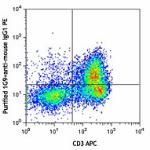
Con A-stimulated (3 days) C57BL/6 mouse splenocytes were sta... 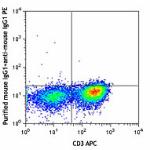
-
PE anti-mouse TIGIT (Vstm3)
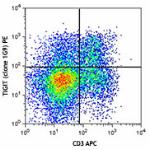
C57BL/6 mouse splenocytes were activated with anti-CD3 and a... 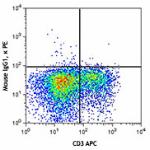
-
APC anti-mouse TIGIT (Vstm3)
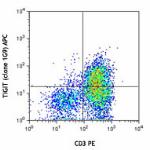
Con A-stimulated C57BL/6 mouse splenocytes (3 days) were sta... 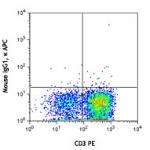
-
PE/Cyanine7 anti-mouse TIGIT (Vstm3)

Con-A stimulated C57BL/6 mouse splenocytes (three days) were... -
PE/Dazzle™ 594 anti-mouse TIGIT (Vstm3)
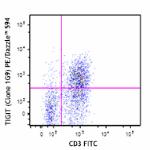
C57BL/6 Mouse splenocytes were stimulated with Con A and IL-... 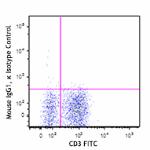
-
Biotin anti-mouse TIGIT (Vstm3)
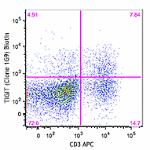
C57BL/6 mouse splenocytes were stimulated with anti-CD3 and ... 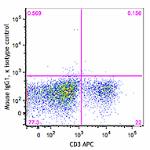
-
Brilliant Violet 421™ anti-mouse TIGIT (Vstm3)
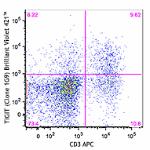
C57BL/6 mouse splenocytes were stimulated with anti-CD3 and ... 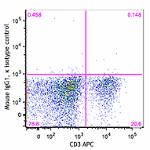
-
TotalSeq™-A0848 anti-mouse TIGIT (Vstm3)
-
TotalSeq™-B0848 anti-mouse TIGIT (Vstm3)
-
TotalSeq™-C0848 anti-mouse TIGIT (Vstm3)
-
Brilliant Violet 605™ anti-mouse TIGIT (Vstm3)

ConA-stimulated C57BL/6 mouse splenocytes (3 days) were stai... -
Spark Red™ 718 anti-mouse TIGIT (Vstm3) (Flexi-Fluor™)
-
Spark Blue™ 574 anti-mouse TIGIT (Vstm3) (Flexi-Fluor™)
-
Spark Blue™ 550 anti-mouse TIGIT (Vstm3) (Flexi-Fluor™)
 Login / Register
Login / Register 










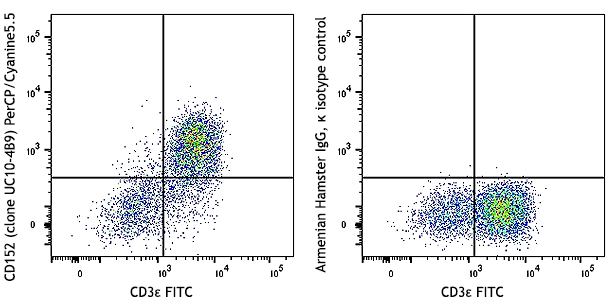
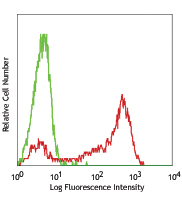
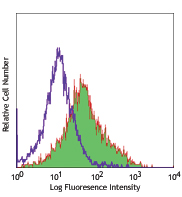
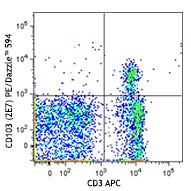



Follow Us